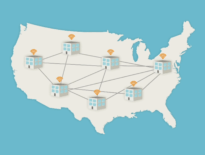Update 7/7/20:
The U.S. House of Representatives passed the Moving Forward Act, which includes the Accessible, Affordable Internet for All Act, on Wednesday, July 1. The bill is currently in the Senate, where Majority Leader Mitch McConnell has announced his opposition to the legislation, calling it “pointless political theater,” and saying, “this nonsense is not going anywhere in the Senate.”
Original article:
Yesterday, representatives in the U.S. House introduced the Accessible, Affordable Internet for All Act, which calls for the federal government to invest $100 billion to ensure all Americans have access to affordable, high-quality Internet access — a need that has been exacerbated by the ongoing Covid-19 crisis.
The proposed legislation would fund broadband deployment in unserved and underserved areas and provide affordable home Internet access, among other measures meant to reduce the digital divide in both rural and urban communities. It would also remove state restrictions on community-owned broadband networks.
“This bill is an historic effort to address all the causes of our persistent digital divide,” said Angela Siefer, Executive Director of the National Digital Inclusion Alliance, in a statement.
Contact your House representative this week to ask them to support the Accessible, Affordable Internet for All Act and to sign on as a cosponsor. Find your representative and their contact information using this online search tool. Keep reading for more details on the legislation and a short example of what you can say to your representative.
“A Major Leap” Toward Connecting Everyone
House Majority Whip James Clyburn of South Carolina introduced the Accessible, Affordable Internet for All Act alongside the House Rural Broadband Task Force and House Democrats. The bill currently has more than 30 cosponsors, including Rep. Ro Khanna of California, Rep. Dave Loebsack of Iowa, Rep. Ben Ray Luján of New Mexico, and Rep. Terri Sewell of Alabama.
In a statement announcing the legislation, Rep. Clyburn said:
In my home state alone, nearly 1 in 10 South Carolina households lack access to a reliable broadband connection. That is why I am proud that the Rural Broadband Task Force, in collaboration with members of the Energy and Commerce Committee, crafted the Accessible, Affordable Internet for All Act to address this issue once and for all.
The largest provision of the bill is an $80 billion investment to deploy broadband in unserved and underserved areas. “Unserved” is defined in the legislation as lacking access to broadband speeds of 25 Megabits per second (Mbps) download/25 Mbps upload, and recipients of the funds must deploy networks capable of 100/100 Mbps, ensuring that they can meet future broadband needs. The program will distribute funds through a competitive bidding process that prioritizes higher speeds and open access models (as found in Ammon, Idaho, or UTOPIA’s network in Utah). A quarter of the broadband deployment funds will go to states to disburse themselves.
In addition, the Accessible, Affordable Internet for All Act removes state barriers to municipal, cooperative, and other community broadband networks, currently in place in 19 states.
To ensure that households can actually access existing broadband networks, the bill sets aside $9 billion to subsidize broadband connections for low-income Americans. It also requires broadband providers that receive funding offer an affordable subscription option, invests in digital inclusion programs, and includes measures to connect schools and students.
Christopher Mitchell, Director of the Community Broadband Networks initiative at the Institute for Local Self-Reliance said of the bill:
This legislation represents a major leap toward the goal of expanding high-quality Internet access to everyone – rural and urban and in between. We need these policies to achieve a more prosperous and equitable society in the same way electrification and telephones created more opportunity for everyone.
Learn more about the Accessible, Affordable Internet for All Act.
Share Your Support
Find your representative online, and give them a call or send an email to ask for their support of the Accessible, Affordable Internet for All Act. Ask your friends, family, and neighbors to do the same.
When contacting your representative, try to include a personal story or anecdote that shows why access to affordable, high-quality broadband is important to you and your community. For instance, you could say, “I’ve seen the impact that not having Internet at home has had on some of my students’ educations” or “My elderly parents, who live in a rural area without Internet access, have not been able to meet with their doctors since the Covid-19 pandemic started.” Look at the example letter below for ideas of what you can say:
Hello [REP. NAME],
As your constituent and a concerned citizen, I am asking you to support the Accessible, Affordable Internet for All Act, which takes bold steps toward closing the digital divide.
Not only does the bill invest tens of millions in expanding high-quality broadband infrastructure, but it also gives communities the authority to solve their own Internet needs and ensures that all Americans can afford a broadband connection.
I understand the importance of better, more affordable connectivity in [YOUR STATE] because [REASON OR ANECDOTE]. By investing in high-speed broadband networks and providing affordable Internet connections, this bill would help guarantee that everyone in our state can access the educational, economic, and healthcare benefits of connectivity.
As your constituent and a voter, I consider this issue a priority. Please consider supporting the Accessible, Affordable Internet for All Act and signing on as a co-sponsor.
Thank you for your time and your service.
Sincerely,
[YOUR NAME]
The Accessible, Affordable Internet for All Act is included in the Moving Forward Act, which House representatives will likely vote on as part of Covid-19 relief legislation.
Image of Rep. Clyburn is a U.S. Air Force photo by Airman 1st Class Hunter Brady.
This article was originally published on ILSR’s MuniNetworks.org. Read the original here.





